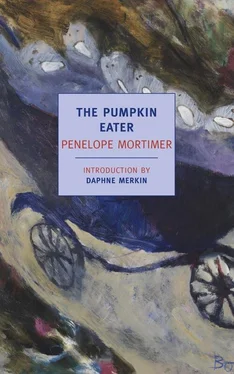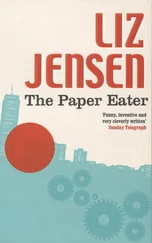“But of course that’s not true.”
“No.”
He looked up at me, smiling. “Go on. When you first met him, what was he doing?”
“He’d just begun to work in films, but he was only doing re-writes, nothing very much, he didn’t even know whether he’d be able to go on. The first time I met him, he came to tea.” I hesitated, but he seemed fairly interested, so I went on. “Jake was a friend of Giles’s and he came down from London, it was a Sunday. We lived in a sort of barn — I told you, I think, that’s where we’re building the tower — someone had begun to convert it before the war, then when the war came they just left it and we rented it for practically nothing. It was a very sensible place for us really. It was huge, there was nothing inside except a big platform, like a gallery. But it had light and water and drains, because they’d already put them in. Giles collected a lot of hardboard from somewhere — he was very practical, for a violinist — and made dozens of partitions, like loose boxes, he called them areas. So we had these areas for everything, even one for him to play the violin in, but since the walls were only about six feet high the children used to climb over them, though Giles kept telling them he’d left perfectly good pathways. After a bit they got very shaky and some of them fell down, but by that time I think Giles knew it was all over so he didn’t bother to fix them up again. They were just left propped about. I was always falling over them with trays … Anyway, Jake came to tea. I was pregnant, about seven months pregnant, and I was wearing the most dreadful smock, and boots because it was so cold. It must have been chaos. It’s funny, I can’t remember. I can remember it happening, but not what I thought or felt or what we talked about, except that Dinah sat on Jake’s knee. She was nearly four. He always liked Dinah best because her father was dead, also because she was very pretty. He told me afterwards that he fell in love with me then, that afternoon, that he wanted to make love to me. I don’t know if it’s true. I think he wanted to join us, that’s all. I think he wanted … to belong to us.”
“Yes,” he said. “Yes.”
“So he married me.”
“Yes.’
“We were very happy.”
“I’m sure you were.”
“He enjoyed everything — things that I’d got so used to, I didn’t notice them any more. He used to help put them to bed — I mean, they weren’t his, after all — and tell them great stories and play with them. He worked hard, perhaps in a way he worked harder than he does now, but because it was for a different reason it was easier. I find all this hard to explain. Christmas, for instance. When he was a child he hated it, he was all alone, they used to have dinner in the evening and make him wear a dinner jacket and then when the port came he was sent to bed. The first Christmas he knew us he hacked down an enormous tree, much too big, and they all carried it in and he decorated it, he made an angel for the top. Then on Christmas Day he did a play with them but they all laughed so much that… I’m sorry. I’m sorry.”
“That’s all right. Don’t worry.”
“Now he sends his secretary to Hamleys and everything comes wrapped, and except for the youngest ones they’re all bored and hating it because he does nothing but tell them how expensive it is and how meaningless. And anyway there’s nothing to give. That Christmas I gave him a snow-storm, a glass ball.”
He waited for a moment. “When did his success begin? Some time ago, I take it?”
“He wrote a film about…Philpot. It was about a girl who went around breaking up people’s marriages, but always by mistake, comically. It started with all the ushers in the Divorce Court saying hullo to her in the morning, because they knew her so well. It was sexy and it made people laugh. That was the beginning. It was about eight years ago.”
“And life changed.”
“Not all at once. Of course it didn’t. But we bought a lot of things — furniture, machines, cars. We got help. I don’t know why it’s called help.”
“You mean servants?”
“We don’t call them servants.”
“It must have been a relief to you.”
“At first it was. The idea of it was. I imagined I’d have more time for Jake. But we all began to live alone, that’s what really happened. We got men in to paint the rooms, and we didn’t have to wash up any more, the children didn’t come and grate cheese or make biscuits, in the evening they watched television, but not with us, and in the afternoons they went out for walks with the help. We drove about alone in our cars and we went away for holidays without Jake, because he was working. He took an office and …”
“And what?”
“I don’t know. We’ve managed it badly, I suppose. There’s nothing left.”
He sighed, as though he thought the story had been a sad one. Then he asked abruptly, “Do you like Jake?”
“Like him?”
“Apart from everything else you feel about him, all your conflicting emotions … Do you like him?”
“No,” I said. “Not very much.”
“That’s my impression. Why don’t you like him?”
I tried to think. One by one I turned over the possible reasons for disliking Jake: he is a coward, a cheat, he is mean, vain, cruel, he is slovenly, he is sly. “I… I don’t know,” I said.
“But you love him?”
“Yes. Yes, I love him.”
“You want your marriage to survive?”
“Yes.”
“Do you think that in order for your marriage to survive there should be some … change?”
“Yes.”
“Do you think Jake is liable to change?”
“No.”
I felt that I had at last given him a correct answer. He folded his file, screwed up his pen, with the air of a man whose backward pupil is beginning, after long weeks of patience and work, to make a little progress. “Think about what you have just said. Just chew it over a little during the next couple of weeks. Will you do that?”
“Couple of weeks?”
“I shan’t be seeing you again for a fortnight. Surely I told you?”
“No — ”
“Oh, really — I’m so tremendously sorry. I quite thought I’d told you last time. We’re off to Gstadt on Friday for a spot of ski-ing.” He grinned bashfully. “It’s my great passion, I’m afraid.”
“But…” I couldn’t believe it. Leaving me? Leaving me now? “But what about…?”
“Keep on with the pills, if you need them. Oh, and cut down on liquids as much as you can. We’ll make an appointment, shall we, for the … 19th? Would the 19th suit you?”
“I can’t manage the 19th. I know I can’t.”
“Then why don’t you give me a ring in, say, three weeks’ time? See how you get on.” He beamed at me, persuasive, bland as a salesman leaving a free sample. No obligation, madam, it’s entirely up to you.
“Jake will be back by then. I don’t think I shall be able to manage it.”
“Oh, come now …”
“No,” I said. “I don’t think I shall be able to manage it.”
“But it would be such a pity if you gave up …”
“If I gave up? What do your patients do while you’re away? Commit suicide, murder their wives, or do they just sit and cry and take pills and think about what they told you last time? Supposing I take it into my head to get pregnant again? That’s my disease, isn’t it? Wouldn’t it be a great deal simpler just to … sterilize me, or whatever it is they do, then you could go off to your ski-ing without a care in the world? If I’m sane enough to be left alone with my thoughts for two weeks then I’m too sane to need these futile, boring conversations — because my God, they bore me — at six guineas a time. I thought I was meant to…” I shut my mouth, clenching it tight. The wailing stopped. The room was peaceful. I said carefully, “It doesn’t matter what I thought. I was wrong. I’ll go now.”
Читать дальше












